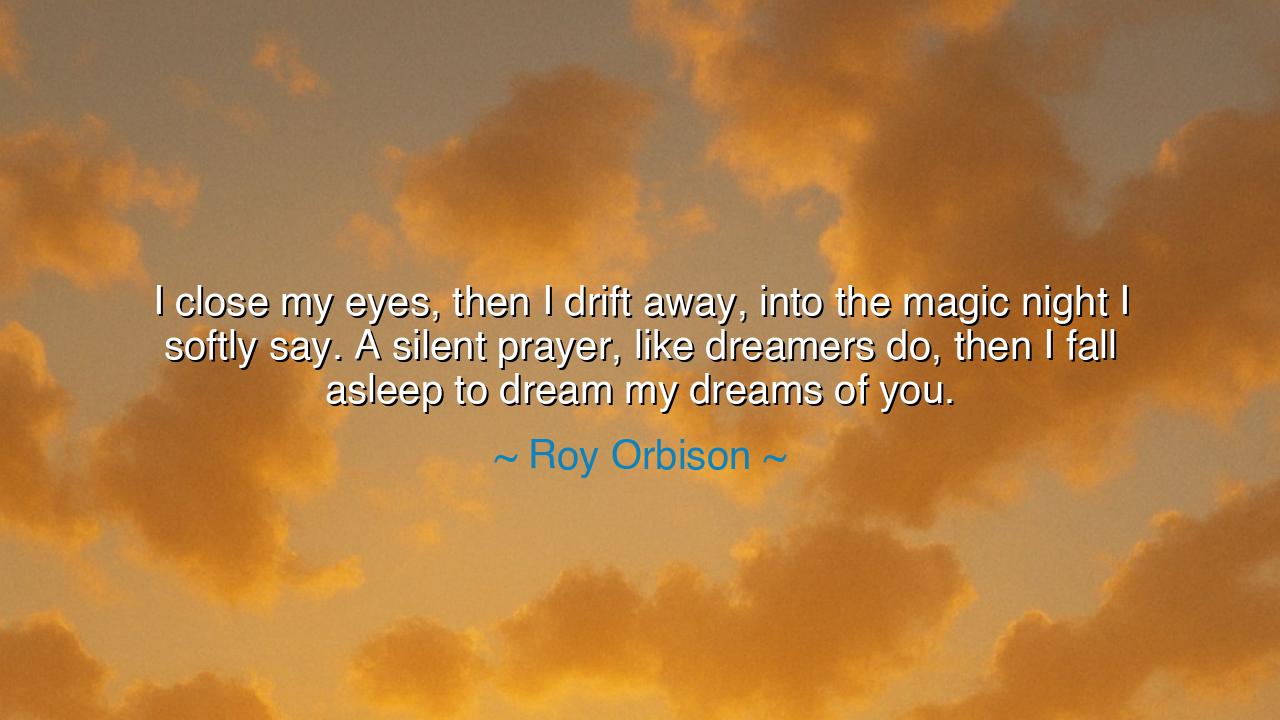
I close my eyes, then I drift away, into the magic night I softly
I close my eyes, then I drift away, into the magic night I softly say. A silent prayer, like dreamers do, then I fall asleep to dream my dreams of you.






“I close my eyes, then I drift away, into the magic night I softly say. A silent prayer, like dreamers do, then I fall asleep to dream my dreams of you.” Thus sang Roy Orbison, the troubadour of tenderness, whose voice carried both the sorrow and the splendor of the human heart. Though these words were born in song, they speak with the soul of poetry, touching a truth as ancient as love itself. For in them lives the eternal longing of humanity—the yearning that bridges the waking world and the realm of dreams, where desire takes form and memory becomes light.
To understand this quote is to step into the quiet mystery of dreaming and devotion. Orbison’s words are not merely about love for another person; they are about the sacred act of closing one’s eyes to the world, surrendering to the unseen, and daring to believe in something beyond reach. The magic night he speaks of is the inner landscape of the heart, where imagination and emotion intertwine, where prayer and dream become one. In that stillness, the soul whispers what the lips cannot say—a silent plea to the divine, a yearning for what is pure, lost, or yet to come.
Born from Orbison’s song In Dreams (1963), these lines carry a haunting beauty, for they speak of both hope and heartbreak. He was a man who knew the ache of love deeply—his life shadowed by tragedy, the loss of his wife and children—and yet his music never turned bitter. Instead, he wove his pain into melody, turning grief into something eternal. Through this, he teaches us that the dream is not mere escape, but a way to keep love alive. When the waking world becomes too heavy, the dreamer does not run from it; he transforms it into something luminous, something bearable.
In truth, Orbison’s words echo the wisdom of the ancients. The Greeks believed that dreams were the bridge between gods and mortals, that in sleep, the soul wandered beyond the body to touch eternity. The philosopher Aristotle wrote that dreaming reveals the hidden movements of the heart, and that in those visions, truth can often be found more clearly than in waking reason. Likewise, in Orbison’s prayer before sleep, there is both humility and faith—the belief that love, though unseen, is real enough to reach through darkness.
The silent prayer he speaks of is an act of surrender, not of weakness but of courage. It is the moment when the heart admits its vulnerability and yet refuses despair. Like a pilgrim lighting a candle in the night, he entrusts his longing to something greater than himself. Every dreamer knows this ritual: that before rest, we whisper our hopes into the void, not knowing if anyone hears. Yet the act itself is holy, for it affirms belief—the belief that love endures, that the spirit is never truly alone.
History gives us many who lived this truth. Consider Helen Keller, blind and deaf from infancy, who said that her inner vision was her salvation. Though her eyes saw nothing, she dreamed of light, and through that dreaming she brought light to others. Like Orbison, she knew that to close one’s eyes is not to retreat, but to awaken the inner world—to see with the soul. Her silent prayers, like his, shaped her destiny and became a beacon for humanity.
So, my child of longing and light, remember this: the dream is not a place of escape, but of remembrance. When the world grows cold and the heart weary, close your eyes—not to forget, but to remember what truly matters. Let your dreams be your sanctuary and your strength. Speak your silent prayers, not in fear, but in faith that they are heard. For in every heart that dares to dream with love, there burns a spark of the eternal.
And when you drift into your own magic night, know this: to dream is not to flee reality, but to restore it. The dreamer keeps the world alive by imagining what it could be. So fall asleep, as Orbison did, with reverence in your heart and hope in your soul. For the one who dares to dream of love, even in sorrow, is never lost—they are simply walking the unseen path toward the dawn.






AAdministratorAdministrator
Welcome, honored guests. Please leave a comment, we will respond soon